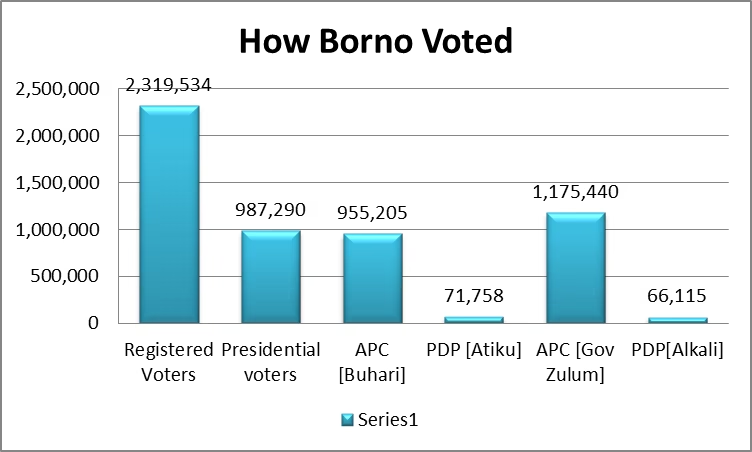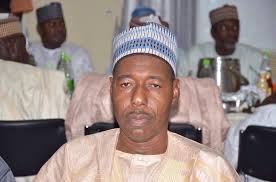[Explainer] Why high turn-out in Borno elections despite 20 Boko Haram attacks


Incoming Borno State Governor Zulum
The February 23 Presidential and National Assembly elections showed a strikingly impressive voter turnout nationwide as some 955,205 citizens voted at the presidential election in Borno State.
The March 9 Governorship and State Houses of Assembly elections showed a strikingly depressive voter turnout nationwide; 1,298,027 citizens voted at the governorship election in Borno State.
Early morning of February 23 about 16 mortars were fired at Maiduguri, reportedly by the Boko Haram terrorists.
The terrorists also reportedly attacked Magumeri and Gajiram, both in Northern Borno, a day before the Presidential and National Assembly elections.
All the attacks aimed apparently at scaring the IDPs and other residents away from trooping out to the polling units.
There was, however, also the argument about the attacks aimed at conjuring up some pretexts or alibi for the manipulation and skewing of the electoral process to achieve certain purposes.
In contrast, voters, most fascinatingly the IDPs, massively thronged all voting centres, vowing not to be deterred by anything less than a mortar that eliminates them all, to exercise their franchise, most intently to vote for ‘Baba Buhari’.
Ditto, at Gwoza about 150 km away, on the same day, where two rockets were reportedly fired at a polling centre, killing two voters.
Very strikingly, the huge crowd of the exceptionally determined Gwoza voters merely shifted to another centre hurriedly arranged for them, and the polling process went on well.
By 6:20pm of Friday, 8th March, that is, less than 14 hours to the commencement of the Saturday, 9th March governorship and state assembly elections, the terrorists attacked Mafa, the hometown of the then APC governorship candidate, Professor Babagana Umara Zulum.
The attack was quelled by troops there. The majority IDPs population of Mafa had a peaceful voting day.
The point of note here is, there were attacks only within the about 14 hours before the commencement of polling activities.
Those attacks were all that could come in the form an attempted deterrent by the terrorists in what was portrayed as their determination to stop the elections.
No more terrorists attacks thereafter; the massive and lean populations of voters on 23rd February and 9th March, respectively, enjoyed peaceful voting days, amidst a situation that evidently radiated marvellous work by security agents, but immanently stank of some perplexing contrasts.
The web of perplexities enmeshing all these bafflements, the block-voting pattern, the titanic Buhari and Atiku personalities; as well as several other activities, characteristic of partisan politics and elections, tell the story of 23rd February and 9th March in Borno State.
Over the last four years, the terror-troubled Borno State has, in spite of the characteristic obstinacy and tenacity of terrorists in unleashing their endeavours on the territories they control, or struggle to control, Borno State has been able to, incontrovertibly, achieve significant reunion and reintegration with its sister states in terms of substantial security and resuscitation of activities in all facets of civil life, including normal political life.
It is noteworthy that substantial sections of the Northern and Central Senatorial Districts, and a little section of the Southern Senatorial District (Gwoza and its Sambisa vicinities) are still persistently troubled by the Boko Haram terrorists of the Islamic State of West African Province (ISWAP) to the frightening point of portraying majority of the returnee, or still ruined, communities there as virtually still unliberated by the troops of Operation Lafiya Dole and the multinational joint taskforce.
Such communities constitute territories virtually ‘ruled’ by the terrorists, in so far as the terrorists reportedly roam and conduct their normal activities there, enjoying the total submissiveness of the lean populations there; and no troops dare say them nay.However, the ‘marvelous’ (would you like to say perplexing?) substantial security portrayed to have been restored there to the point of now guaranteeing safe transportation of hundreds of thousands of IDPs between camps in Maiduguri and other locations, and their respective home communities; or from other insufficiently secure returnee communities to Maiduguri, to cast their votes, stank of capital-intensive pranks, albeit arguably, to facilitate rigging of the elections, using the IDPs and returnee communities as most veritable tools.The contrast is: How come there were about 20 reported apparently election-related attacks all over the state, killing two voters at Gwoza, between about 14 hours to the elections, and a couple of hours into the elections? Were the terrorists, who have never minced any words in denouncing anything modern, mainly including ‘Boko’ (western education) and democracy, so easily placable, through whatever arrangement, that they so ‘marvelously’ offered cessation of attacks to guarantee security throughout the periods of the elections?Were the troops of the Operation Lafiya Dole Theatre Command and the Multinational Joint Task Force so marvelously efficient that they could enforce the cessation of attacks by the terrorists to guarantee security throughout the elections periods?Why, then, were they finding it so difficult to deploy whatever strategies they used for the election periods at other times before the elections when the terrorists used to, reportedly, dispossess them of their arms and chase them out of their formations, killing an unreported frightening number of troops?Every investigative reporter would be tempted by this situation to attempt prognosticating the causes of the free and secure transportation of Nigerian refugees in Cameroon and Niger Republic into Gamboru and Maiduguri respectively to vote, without any reported attempt by the terrorists, who reportedly operate so thickly along the borders, to attack their convoys and even abduct many of them.The 23rd February and 9th March elections processed through such perplexingly contrasting situations, to stage a very striking game of contrasts.First, the APC-controlled state government had decided on the block-voting pattern for the elections, called in the Hausa jagon: ‘APC Sak’, implying, ‘all APC, top-bottom’. With this pattern, all APC candidates for all the elective posts, from the presidency to the house of assembly membership, were to be, and were indeed, elected.The presidential contest, which seemed the most significant, was between the so-well-marketed ‘master of the game’ son of the Northeast, of which Borno is a significant part, former Vice Predident Atiku Abubakar of the PDP; and a personality noted in the nation’s political history as a ‘phenomenon’, incumbent President Muhammadu Buhari of the APC.Majority of the Borno voters nurse intense hatred for the PDP as a party they have all along regarded as the creator and sponsor of the Boko Haram terrorism that has persistently torment them.Consequently, their intense negative obsession with everything the opposition party stands for has impaired their vision about anything good in however it aspires to govern the state if its candidates are elected.This situation, compounded by the smeared-with-the-corruption-tar-brush fate of Atiku Abubakar and his observed failure to do, however, little he could towards rescuing the Northeast of its traumatising situation, aped him as the party’s presidential candidate.Such has persistently been the case to the extent that except for the exceptional love and trust the electorate have for particular PDP candidates such as Isa Lawan Kangar and Abdulsalam Mustspha Kachalla for the Borno North and Maiduguri Metropolitan senatorial and House of Representatives seats, respectively; as well as any exceptionally effective rigging pattern, the party cannot win any election.The PDP virtually exists only in name in Borno State, until any day the state’s political Juggernauts decide, for whatever reason, and in the process of whatever calculations on the political abacus, readopt it as the state party and adorn it to the adoration of the state’s electorate. This, for now, seems a distant possibility.
On the other hand, the Borno electorate have, since the 2015 electioneering campaigns, developed exceptional love and affection for the APC, the party they regard as their salvager from the Boko Haram terror. Their political and electioneering culture has, over the last four years, therefore, been bred on this ‘lovely and affectionate relationship’ with the APC.
Consequently, the illimitable love they have developed and maintained for the personality that has undoubtedly been the fulcrum of the love and affection they have for the APC, the salvager called Muhammadu Buhari, as well as their deep positive obsession with everything about him, seem to have combined opium-effect on their minds.
Such opium-effect has reached the point of impairing their capacity to look beyond him, perchance they will see as good a leader as him, or even better, under the circumstances.
Ditto on the gubernatorial pedestal where the personality of Mohammed Alkali Imam of the PDP, was no match for the APC’s Professor Babagana Umara Zulum, the scion of the RRR (he was the former commissioner in charge of the Ministry of Reconstruction, Rehabilitation and Resettlement, an interventionist establishment in the broad project of returning the liberated communities to normal life in the envisioned post-terror era).
So, the elections held. The registered voters for all the elections in Borno State were 2,319,534 (2.3 million).
For the Presidential and National Assembly elections of Saturday 23rd February, exercised by an impressively ‘massive outpouring’ of voters, 987,290 were accredited.
Out of these, 955,205 voted to decide the presidential victor – incumbent President Muhammadu Buhari was the victor by collecting 836,496 votes, defeating former Vice President Atiku Abubakar, who collected 71,788 votes.
For the governorship and state assembly elections, exercised by a depressively scanty clusters of voters at majority of the PUs, however, 1,292,138 voters were accredited to decide the gubernatorial victor – APC’s Professor Zulum, popularly called RRR, was the victor, collecting 1,175,440 votes, defeating his distant trailer, PDP’s Mohammed Alkali Imam, who collected 66,115 votes.
In the adopted block-voting arrangement the pattern of voting ran vertically down to the State House of Assembly members.
All candidates of the APC – Muhammadu Buhari, Babagana Zulum, the 3 Senators, 10 House of Representatives members and 28 State House of Assembly members – emerged the victors at the 2019 elections in Borno State.
Thanks to a well-crafted process laced with perplexities and contrasts.
Sign up for The Insight Newsletter
Get in-depth, research and data-based interpretative reports from around Nigeria.



